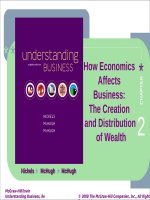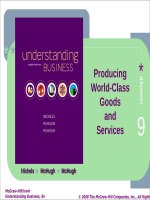Understanding business 8th by mcchugh nickels chapter 02
Bạn đang xem bản rút gọn của tài liệu. Xem và tải ngay bản đầy đủ của tài liệu tại đây (5.76 MB, 37 trang )
*
*
*
How Economics
Affects
Business:
The Creation
and Distribution
of Wealth
Nickels
*
McHugh
McGraw-Hill/Irwin
Understanding Business, 8e
*
*
CHAPTER
**
2
McHugh
1-1
2-1
© 2008 The McGraw-Hill Companies, Inc., All Rights
*
*
*
Economics: Create
Wealth
•
Study of how society chooses to
employ resources to produce
goods & services and distribute
them among competing
groups/individuals
•
Micro v. Macro
•
Resource Development
2-2
*
*
*
Four “What’s” of
an Economic System
$ What is produced?
$ What amount is produced?
$ What is the method of output
distribution?
$ What is the rate of economic
growth?
Adapted from: Edwin Mansfield Economics (New York: W.W. Norton, 1976), p.8
2-3
*
*
*
Economic Theories
•
Thomas Malthus (Early 1800s)
• “Dismal Science”
• Too many people
•
Adam Smith (1776)
• Freedom is vital
• “Invisible Hand”
2-4
*
*
*
Circular Flow Model
2-5
*
*
*
Three Economic Systems
Mixed
Socialism
(Highly Controlled)
(Little Control)
Communism
Capitalism
2-6
*
*
*
Free-Market Capitalism
•
Private Property
•
Business Ownership/ Profits
•
Freedom of Competition
•
Freedom of Choice
2-7
*
*
*
Supply Curve
High
Price(P)
S
Low
Quantity(S)
High
2-8
*
*
*
Demand Curve
High
Price(P)
D
Low
Quantity(D)
High
2-9
*
*
*
Equilibrium Point
Surplus
High
Market Equilibrium
Price
S
Low
Shortage
Quantity
D
High
2-10
*
*
*
Free-Market Competition
Monopolistic
Oligopoly
Competition
One
Many
Perfect
Competition
Monopoly
Sellers
2-11
*
*
*
Perfect Competition
Sellers
Buyer
2-12
*
*
*
Monopolistic Competition:
Many Sellers With Perceived Differences
•
Fast Food
•
Colleges
2-13
*
*
*
Oligopoly: Few Sellers
•
Automobiles
•
Tobacco
2-14
*
*
*
Monopoly: One Seller
•
Utilities
• Microsoft?
2-15
*
*
*
Limits of Free-Markets
•
Inequality of Wealth- Causes
National & World Tension
•
Greed Compromises Ethics
•
Limitations Push Country
towards Socialism =
Government Regulation
2-16
*
*
*
Number of Workers per
Social Security Recipient
Source: Investors.com
2-17
*
*
*
Industrialized Nations’
Top Individual Tax Rate
Source: www.worldwide-tax.com, May 9, 2006
2-18
*
*
*
Socialism
•
Private & Public Ownership
•
Some Choices are Limited
• Creates Social Equality
• Reduces Individual Incentive
- Brain Drain
2-19
*
*
*
Communism
•
Public Ownership
•
Almost all major factors of
production
Central Planning/Controlled
Economy
• Shortages of food and other products
•
may develop
• Lack of motivation to work hard for
business people
2-20
*
*
*
Mixed Economies
•
Free-Market Economy = Capitalism
•
Command Economy
• Socialism
• Communism
•
Trend Results in Blend/Mix
• Capitalism > Socialism
• Socialism > Capitalism
2-21
*
*
*
Why is the U.S.
an Economic Success?
Major Reason
Percent*
Constitution
85
Free Elections
84
Free Enterprise System
81
Abundant Resources
78
Cultural Diversity
71
* Respondents could choose more than one.
Source: Investors Business Daily Survey
2-22
*
*
*
U.S. Economy
•
•
•
•
•
•
Key Economic Indicators
Productivity in the U.S.
Productivity in the Service Sector
Business Cycles
•
•
•
Recession
Depression
Recovery
Stabilization
•
•
Fiscal Policy
National Debt
Economic Growth through Monetary Policy
2-23
*
*
*
Key Economic Indicators
•
Gross Domestic Product (GDP)
•
Unemployment Rate
•
Price Indexes
• Consumer Price Index (CPI)
• Producer Price Index (PPI)
2-24
*
*
*
U.S. Gross
Domestic Product
In Billions of U.S. $
Source: U.S. Dept. of Commerce, Bureau of Economic Analysis
2-25









